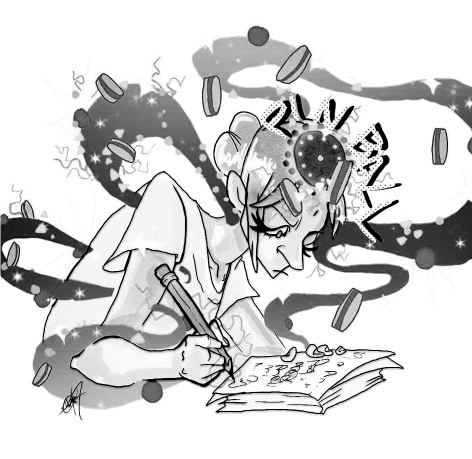Jodie Vanderslot | Health Editor
Featured Image: I started writing because I needed a way to trace back the conclusions I would jump to, to ease the noise inside my head. | Rowan Campbell
Do you remember when computer games consisted of minesweeper flags, solitaire, and pinball? Occasionally, I would dabble and entertain myself with Paint—however, I found myself gravitating rather heavily towards the pinball game. I was so intrigued that, no matter how hard I would strike the keys that triggered the tiny little pegs launching the minuscule ball, or how soft my fingers pressed against the keys as if by reflex, that tiny ball would still go at it’s own speed.
Sometimes, I would hit the keys ever so slightly and that little ball would be sent launching, ricocheting off everything. Lights flashing and sounds blaring, it would look in desperation for a place to settle for just a brief moment—but it was always shuffled back again across the screen.
Passed on to the next bumper, frantic to try and relieve itself, placing the burden elsewhere. My smashing of the keys or gingerly pressing down on them didn’t really matter—it seemed to happen whether I wanted it to or not; a random shuffle of codes.
That’s kind of how my thoughts are.
My thoughts are spring-loaded, ready to launch in any direction. My mind is a machine that I struggle to control with feelings that I’m trying to triangulate and settle. In the moment it feels like I’m doing my best, but almost seconds afterwards, I can think of a hundred and one different ways that this scenario could have played out in an alternate way.
There are times when I feel like I am progressing forward, only to find myself being launched in a completely different direction without warning. I’m disoriented and knocked off my initial course—yet somehow, I’m still in motion.
Anxiety tells me lies I have to talk myself out of believing. It weaves stories and spin webs that I find myself trapped inside. My thoughts play on a loop and I begin to believe in my own convictions.
I’m under pressure and can hear everything inside me echoing against the shell of my body—it’s a game inside my head.
I started writing because I had more thoughts than I knew what to do with. I needed some way of expressing myself, because I couldn’t make the words I needed to say come out of my mouth—I couldn’t articulate them in speech, or make them fit into a conversation with coherence. So I remained quiet for an extensive time, because I felt like I had no way to convey all the things I wanted to say, or make the thoughts bouncing around in my head make sense to anyone else.
On paper, though—I am loud.
Expressive writing comes from our core. It pulls from experiences and gives you a means of letting everything out. It is a chance to allow yourself to be openly vulnerable. It is deeply personal and emotionally charged with lengthy descriptions and heavy thoughts. It is writing without barriers, without regulation or care if it comes out right, just so long as it comes out. Grammar and punctuation come after—just let the words and thoughts pour out, until you’ve said it all.
Expressive writing grants you complete freedom—it can be about anything. It can be seen in the hundreds of notes on my phone, containing scrambled sentences or paragraphs among paragraphs that would run on for too long.
The truth is, I’ve probably written about you. You might find yourself in traces of the words or amongst some sort of metaphorical message that got left behind. You might notice that the fine details have fragments of your being attached to them. I may have buried my feelings and your sentiment deep in the hollows of my words that fill pages and cloud the screens.
I write to fill in the blanks, to build the bridges I need to get over.
I started writing because I needed a way to trace back the conclusions I would jump to, to ease the noise inside my head. Through writing, I found understanding and honesty.
I stumble into perspective and composure only after writing out my thoughts and trying to narrate the dialogue playing in my head.
Writing is my solace, my safe space—my therapy.
Above all, writing is an outlet—while it is turbulent, it is also the calm in the storm. It is about acknowledging your emotions and giving them meaning. You recognize your scars, the tears, joy, and pain, giving it a reason—and in that, you find it’s purpose.
Amongst the chaos, you are the one that’s in control.




